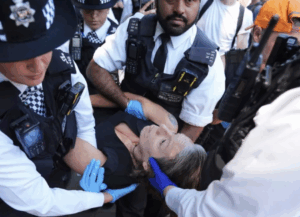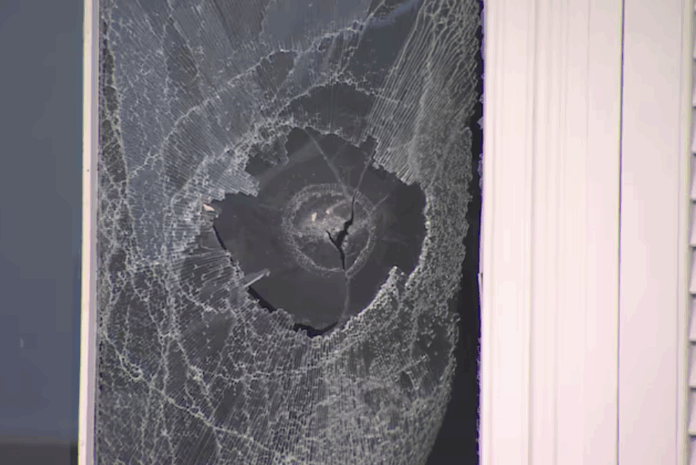As the country loses its mind over Winston’s broken window and his dog, the Government pushes ahead with criminalising protest outside politicians homes and the protestor who put Winston’s address online has been cut from a TV advert while Winston has been allowed to wallow in victimhood.
Let’s remember, Winston is a man who has built a political career out of dog whistle personal attacks on minority, migrants and vulnerable groups.
Remember what he said about Benjamin Doyle, Rawiri’s facial tattoos, Harry Tam, Migrant Green MPs.
More than any other politician in recent years, Winston thrives on exploiting community divisions for political gain.
For him to play the victim is like the Taliban demanding to see the manager.
Let’s be clear, of course, in any normal situation, we shouldn’t protest outside politicians homes, but when it comes to genocide, the frontline for protest is everywhere.
Winston put us on the side of war criminals and genocide, protesting outside his home is a legitimate response to that.
Do you know what the first protests outside Auckland Politicians Houses were?
The Dawn Raids!
That’s right.
Protestors felt that if the Politicians could send the dog squads onto Pacifica communities at dawn, then protestors would return the favour and protest outside their homes at Dawn.
Very few would damn those Dawn Rid protestors now, but because Winston’s doggy woggy had glass shower them, it’s the worst political violence in Western Civilisation.
As Adam Pearse from the NZ Herald notes…
But although Peters condemned the attack on his house as a “disgrace”, he was quite happy to taunt Swarbrick as “crowbar Chlöe”. Shane Jones, vocal even by his standards in defence of his leader, freely bellowed: “Where’s the crowbar?”
Either it’s a serious attack that threatened a politician’s family and crossed a line, or it’s something to tease your political opponent with. It shouldn’t be both.
…if the Government get their way they will be able to imprison you for 3 months for protesting outside their homes, as Rights Aotearoa points out…
A Government bill that would see peaceful protesters jailed for up to three months represents a dangerous attack on democratic accountability and will disproportionately silence marginalised communities, Rights Aotearoa warned today.
The human rights organisation has submitted a comprehensive legal analysis to the Justice Committee urging outright rejection of the Summary Offences (Demonstrations Near Residential Premises) Amendment Bill, calling it “a solution in search of a problem” that criminalises democracy itself.
“This Bill hands elected officials a tool to silence dissent when they find public accountability uncomfortable,” said Paul Thistoll, Chief Executive of Rights Aotearoa. “Discomfort is not harm. Inconvenience is not intimidation. And the price of living in a democracy is that those who wield power must face the consequences of their decisions—including peaceful protests outside their homes.”
The Bill’s Explanatory Note reveals its true purpose, stating that residential protests “have the potential to deter elected officials from taking stands on contentious issues.” Rights Aotearoa says this fundamentally misunderstands democracy.
“If Ministers are deterred from unpopular decisions because they fear public protest, that’s democracy functioning as intended,” Mr Thistoll said. “The alternative—elected officials insulated from public reaction to their policies—is authoritarianism.”
Existing law already covers harassment and intimidation
The submission comprehensively demonstrates that existing legislation—including the Summary Offences Act, Harassment Act, Trespass Act, and Crimes Act—already prohibits intimidation, harassment, threats, trespass, and excessive noise.
“The Government has not identified any gap in the law that justifies this Bill,” Mr Thistoll said. “What existing law doesn’t do is protect politicians from being confronted with the human consequences of their decisions. And it shouldn’t.”
Vague language guarantees discriminatory enforcement
The Bill criminalises demonstrations “near” residential premises that cause “unreasonable disruption”—terms left entirely undefined. Unlike safe access zone legislation, which specifies precise distances, this Bill provides no guidance on what constitutes illegal conduct.
“Protesters cannot know in advance whether they’re breaking the law. Police officers will make subjective, on-the-spot decisions about what’s ‘unreasonable,’” Mr Thistoll said. “We know from decades of research that vague laws are enforced discriminatorily against marginalised communities and unpopular causes.”
Rights Aotearoa predicts the Bill will be disproportionately enforced against Māori sovereignty protesters, climate activists, disability rights advocates, union members, and LGBTIQ+ communities, while more socially powerful groups receive greater tolerance.
The chilling effect will silence those who can least afford it
The submission warns that even if never enforced, the Bill’s existence will silence marginalised voices through its chilling effect.
“Communities already facing systemic oppression cannot afford the risk of criminal records or imprisonment,” Mr Thistoll said. “For many marginalised communities, direct protest is the only avenue for holding power to account. We don’t have the institutional access or resources to influence policy through lobbying or private meetings with Ministers. This Bill forecloses our only meaningful avenue for democratic participation.”
Three months imprisonment for peaceful protest is grossly disproportionate
The Bill imposes a penalty of up to three months’ imprisonment or a $2,000 fine for conduct that involves nothing more than peaceful assembly and expression near a residential property.
“No comparable democracy imprisons people for peaceful protest that doesn’t involve violence, threats, or harassment already criminalised under general law,” Mr Thistoll said. “This Bill places New Zealand outside international norms for the protection of fundamental freedoms.”
The Bill fails the constitutional test for limiting rights
Rights Aotearoa’s legal analysis demonstrates that the Bill fails every component of the section 5 New Zealand Bill of Rights Act proportionality test. The submission argues the Bill:
-
- Is not rationally connected to its objective because existing law already addresses the identified harms
- Does not minimally impair rights—multiple less restrictive alternatives exist
- Is grossly disproportionate in prioritising convenience over constitutional rights
- Uses excessively vague language that violates rule of law principles
“The Bill targets the expressive nature of protest itself, not underlying harmful conduct,” Mr Thistoll said. “It criminalises demonstrations based on location and perceived inconvenience, not because they involve any conduct that would otherwise constitute an offence.”
Rights Aotearoa calls for outright rejection
The organisation urges the Justice Committee to recommend Parliament reject the Bill entirely, rather than attempting to fix its fundamental flaws through amendment.
“This is not a good idea, poorly executed. It is a bad idea that is fundamentally incompatible with New Zealand’s constitutional commitment to freedom of expression and peaceful assembly,” Mr Thistoll said. “The chilling of dissent is not a price worth paying for the comfort of the powerful.”
…if this power had been available to the Police during the Dawn Raids, they would have arrested everyone.
The power is so draconian it is similar to what the UK have down with Palestine Action, as a matter of free speech and democratic rights, if this law passes people have an obligation to turn up and be arrested and imprisoned for 3 months in numbers so great the system gets over whelmed…
Police arrest almost 500 people over Palestine Action support
…this is where we are going to ensure Politicians never face the contempt of their decisions.
Again, under any normal situation, we shouldn’t protest outside Politicians homes, but when they do things totally out of line like the Dawn Raids, like siding with War Criminals, citizens have an obligation to act.

Increasingly having independent opinion in a mainstream media environment which mostly echo one another has become more important than ever, so if you value having an independent voice – please donate here.



Would Posie Parker be allowed to speak if she came again?
Her chances would be better if she spoke in a closed venue, rather than trying to draw two opposing crowds together in a public space.
Tess Tickles – She did try drawing two opposing crowds…those thugs gate-crashed the event
Geez Nathan by your measure she was lucky to get out alive.
But was it a crowbar or a wrecking bar? If you need to dig a post hole in the stony Canterbury plains, you need to be sure to have the correct one. I guess both would make a mess of a window and is not something that should be allowed, although in this instance I have more sympathy for the dog than Winston.
If you’re supposed to be representing the people who voted you into office, then you should be accountable to those same people, not wrapped in cotton wool and bubble wrap, safe in your ivory tower while the policies you advance make the lives of the general populace increasingly difficult.
I wouldn’t expect this dismal failure of a government to comprehend that, given they prefer to ram toxic legislation through at the speed of light and avoid tedious inconveniences like public consultation.
Perhaps it was a pinch bar as they have now been charged with burglary?
I carry a pipe-wrench. Crowbar-pipe-wrench the effect is the same
A crowbar won’t give Winston much leverage while he sides with the babykillers in Gaza.
He’s on the road to earning the sobriquet Whopper Winston – like the young fellow in Generation Kill.
Do you know what the first protests outside Auckland Politicians Houses were? Martyn Bradbury
Who really knows. But the first one I know of, was the protest outside the US consuls home on Auckland’s Paratai Drive in 1967 during the Vietnam war, which turned into a riot when the police were ordered to clear the protesters away.
Three million Vietnamese died in that war, Plus 63 thousand American troops lost their lives. Three times that number of US Vietnam war veterans died of suicide after the war. 34 New Zealanders also died in that war. The Vietnamese were doused with agent orange causing birth defects and cancer, NZ and US veterans caught in the overspray have fathered deformed children and died early deaths related to Agent Orange poisoning.
And what for?
The Vietnamese communist regime that now rules Vietnam which we were told were the worst of the worlst, an even worse bogeyman than terrorists today. Nowadays, both the US and New Zealand have trade relations with. Vietnam. Vietnam airlines regularly fly into Aucland, with direct flights to Ho Chi Minh City and Hanoi.
Protests outside politicians homes are as old as democracy.
Paratai Drive riot, Google Search:
The Paritai Drive riot was an event on October 29, 1967, in Auckland, New Zealand, where a violent clash occurred between anti-Vietnam War protesters and police outside the home of the American consul. The confrontation was part of protests against the visit of South Vietnam’s Premier, Air Vice-Marshal Ky, and marked a significant escalation of public opposition to the Vietnam War in New Zealand.
Context and Causes
Visit of Nguyen Cao Ky: The protest was triggered by the visit of Ky, who was a central figure in the South Vietnamese government during the war.
Rising Opposition: Anti-war sentiment in New Zealand was growing, with many questioning the country’s involvement in the conflict and its close alignment with the United States.
The Event
Protests Intensify: On October 29, the protests outside the American consul’s home on Paritai Drive became heated.
Clash with Police: A significant fight broke out between the police and the protesters, leading to many arrests and widespread media attention.
Significance
Escalation of Violence: The Paritai Drive incident was one of the first instances of violent confrontation between police and anti-war protesters in New Zealand, foreshadowing further unrest like the demonstrations during the 1970 visit of US Vice-President Spiro Agnew.
Public Debate: The protests contributed to the ongoing public debate about New Zealand’s role in the Vietnam War and the nature of foreign policy.
You can be rest assured that if it is enacted, a neoliberal Labour govt won’t repeal it.
Comments are closed.